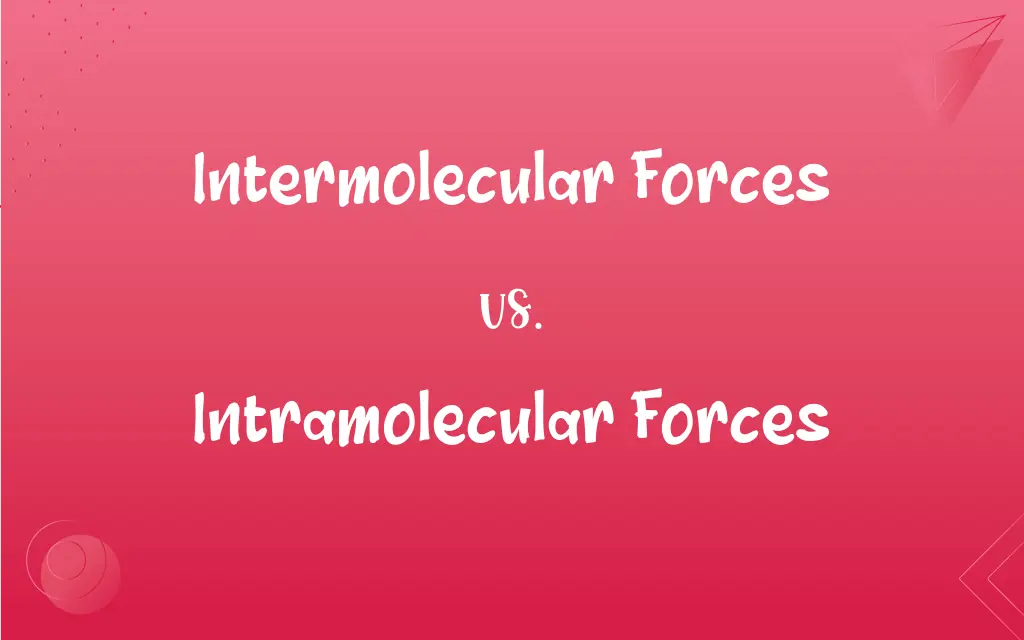Intermolecular Forces vs. Intramolecular Forces: What's the Difference?
Edited by Janet White || By Harlon Moss || Updated on October 26, 2023
Intermolecular forces occur between molecules, while intramolecular forces hold atoms within a molecule together.

Key Differences
Intermolecular forces are the attractive forces that exist between individual molecules in a substance. In contrast, intramolecular forces are the bonds that hold atoms together within a single molecule.
Intermolecular forces play a crucial role in determining the physical properties of substances, such as melting and boiling points. Intramolecular forces, on the other hand, define the chemical properties of the molecule, dictating how it reacts with other molecules.
Intermolecular forces can be of various types, including dipole-dipole interactions, London dispersion forces, and hydrogen bonds. In contrast, intramolecular forces are categorized mainly into covalent, ionic, and metallic bonds.
While intermolecular forces can be disrupted by changing conditions like temperature or pressure, intramolecular forces usually require a chemical reaction to be broken.
Comparison Chart
Location
Between molecules
Within a molecule
ADVERTISEMENT
Types
Dipole-dipole, hydrogen bonding, dispersion forces
Covalent, ionic, metallic bonds
Influence on
Physical properties like melting and boiling points
Chemical properties of molecules
Strength (generally)
Weaker than intramolecular forces
Stronger than intermolecular forces
Breaking method
Changes in temperature or pressure
Chemical reactions
Intermolecular Forces and Intramolecular Forces Definitions
Intermolecular Forces
Intermolecular forces can vary in strength based on molecular structure.
Due to intermolecular forces, iodine forms a solid while bromine is a liquid.
ADVERTISEMENT
Intramolecular Forces
Intramolecular forces are bonds within individual molecules.
The intramolecular forces in a water molecule involve covalent bonds.
Intermolecular Forces
Intermolecular forces include hydrogen bonding and van der Waals forces.
The intermolecular forces in ice are primarily hydrogen bonds.
Intramolecular Forces
Intramolecular forces dictate a molecule's chemical characteristics.
The strength of intramolecular forces affects a molecule's reactivity.
Intermolecular Forces
Intermolecular forces affect properties like vapor pressure and viscosity.
The strong intermolecular forces in honey make it viscous.
Intramolecular Forces
Intramolecular forces require energy to break, leading to chemical reactions.
Breaking the intramolecular forces in methane allows it to combust with oxygen.
Intermolecular Forces
Intermolecular forces influence a substance's state of matter.
Intermolecular forces determine if a substance is solid, liquid, or gas at room temperature.
Intramolecular Forces
Intramolecular forces can be covalent, ionic, or metallic in nature.
Sodium chloride has ionic intramolecular forces.
Intermolecular Forces
Intermolecular forces are attractions between separate molecules.
The intermolecular forces in water cause its high boiling point.
Intramolecular Forces
Intramolecular forces hold the atoms of a molecule in a specific arrangement.
The intramolecular forces in methane keep the hydrogen atoms around carbon in a tetrahedral shape.
FAQs
Are hydrogen bonds a type of intermolecular force?
Yes, hydrogen bonds are a particularly strong type of intermolecular force.
Is a covalent bond an intramolecular force?
Yes, a covalent bond is a type of intramolecular force holding atoms together within a molecule.
Are intramolecular forces involved in chemical reactions?
Yes, breaking or forming intramolecular forces is central to chemical reactions.
Do intermolecular forces influence boiling points?
Yes, stronger intermolecular forces generally result in higher boiling points.
What intermolecular force is present in all molecules?
Dispersion forces (or London dispersion forces) are present in all molecules.
Why are intramolecular forces vital for chemical properties?
Intramolecular forces dictate how molecules react with one another, determining their chemical behavior.
Are intermolecular forces responsible for surface tension in liquids?
Yes, intermolecular forces, especially in water, lead to high surface tension.
Do intermolecular forces play a role in capillary action?
Yes, intermolecular forces between a liquid and a solid contribute to capillary action.
How do intramolecular forces influence molecular stability?
Strong intramolecular forces tend to make molecules more stable and less reactive.
How do intramolecular forces differ from intermolecular forces?
Intramolecular forces hold atoms within a molecule, while intermolecular forces act between molecules.
Which is typically stronger, intermolecular forces or intramolecular forces?
Intramolecular forces, such as covalent bonds, are generally stronger than intermolecular forces.
Can changing temperature affect intermolecular forces?
Yes, increasing temperature can overcome intermolecular forces, leading to phase changes.
What role do intramolecular forces play in molecular geometry?
Intramolecular forces determine the spatial arrangement of atoms within a molecule.
What happens to intermolecular forces in a gas?
In gases, intermolecular forces are weak or effectively overcome due to high kinetic energy.
Can intramolecular forces be both covalent and ionic in a single compound?
Yes, in some compounds like organic salts, both covalent and ionic intramolecular forces can coexist.
Are metallic bonds a form of intramolecular force?
Yes, metallic bonds hold atoms together within metal structures, making them intramolecular forces.
Can intermolecular forces change within a substance?
While the types of intermolecular forces remain constant, their strength can be affected by conditions like temperature and pressure.
Do intramolecular forces define the phase of a substance?
Intramolecular forces determine molecular structure, but it's the intermolecular forces that largely influence a substance's phase.
What are intermolecular forces?
Intermolecular forces are the forces of attraction between separate molecules.
How do intermolecular forces affect solubility?
Intermolecular forces can influence how and to what extent a substance dissolves in a solvent.
About Author
Written by
Harlon MossHarlon is a seasoned quality moderator and accomplished content writer for Difference Wiki. An alumnus of the prestigious University of California, he earned his degree in Computer Science. Leveraging his academic background, Harlon brings a meticulous and informed perspective to his work, ensuring content accuracy and excellence.
Edited by
Janet WhiteJanet White has been an esteemed writer and blogger for Difference Wiki. Holding a Master's degree in Science and Medical Journalism from the prestigious Boston University, she has consistently demonstrated her expertise and passion for her field. When she's not immersed in her work, Janet relishes her time exercising, delving into a good book, and cherishing moments with friends and family.
































































